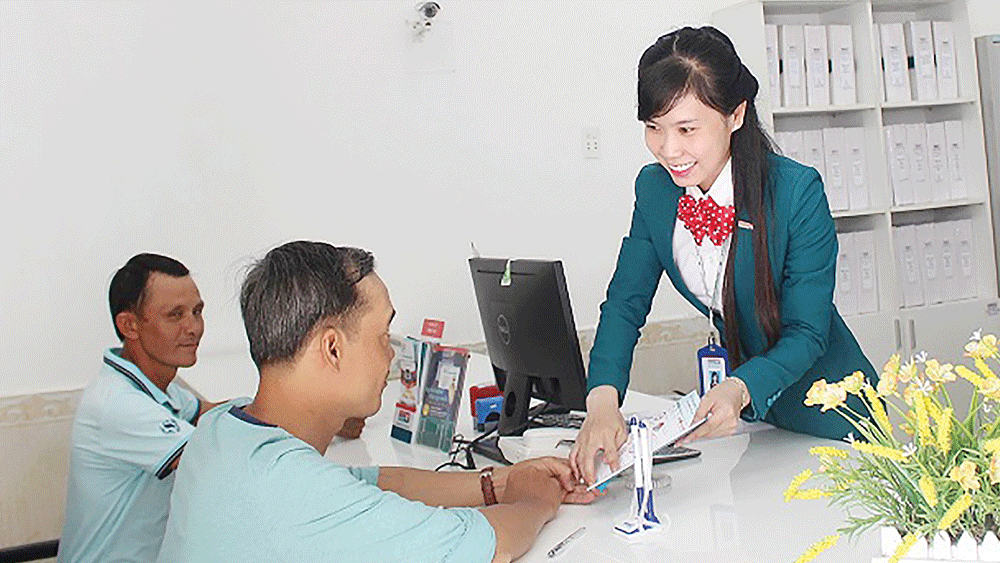
Deputy Governor Dao Minh Tu of the SBV said that as the liquidity of the banking system is currently abundant and banks do not lack capital, commercial banks are not allowed to raise interest rates, even mobilizing interest rates. If necessary, the SBV will adjust the benchmark interest rate, thereby indirectly helping banks to lower interest rates to support enterprises during the Covid-19 outbreak. He also noted that the whole banking system needs to ensure activities to happen normally. Commercial banks need to implement solutions, such as restructuring debts, outstanding loans, and repayment period and considering to lower interest rate. Currently, several banks have joined in helping enterprises affected by the Covid-19. Vietcombank cut interest rate by 1-1.5 percent per annum for credit outstanding balance in Vietnamese dong, depending on term; by 0.5-0.75 percent per annum for credit outstanding balance in US dollar; by 1 percent per annum for new loans in Vietnamese dong and by 0.5 percent per annum for new loans in US dollar. VietinBank offered interest rates at 6.8 percent per annum for some sectors besides an interest rate of 6 percent per annum for prioritized sectors. Agribank gave preferential interest rate at about 6 percent per annum for the agricultural sector. ABBank saved VND2 trillion for preferential loans with interest rates from 9.7 percent per annum, applying until the end of June this year. VPBank lowered its interest rates by 1.5 percent per annum for enterprises affected by the Covid-19. Nam A Bank reduced interest rates by 0.5 percent per annum compared to the current interest rates for enterprises in the fields of tourism, lodging, aviation, agriculture, restaurant, food services, and import-export. ACB offered a new credit package with lower interest rates, at the same time, restructuring the repayment period for enterprises affected by the Covid-19 by transferring a part of interest to next term. To diversify capital channels for enterprises, SHB, MBBank, and BacABank have recently signed a framework contract on indirect lending with the Small and Medium-sized Enterprise Development Fund to help small and medium-sized enterprises (SMEs). Accordingly, enterprises will enjoy preferential interest rates with short-term loans at 4.16 percent per annum and medium and long-term interest rates of 6 percent per annum. The maximum loan for each project or business plan must not exceed 80 percent of the total investment capital of each project or business plan. The loan term is determined in accordance with the ability of capital recovery and repayment of enterprises and the specific conditions of each project and production and business plan but not more than seven years. The maximum grace period for a project is two years. According to experts, although commercial banks provided financial support for people and enterprises affected by the Covid-19, it is not the trend of the interest rate of the market. Vietnam merely cut its benchmark interest rate by 0.25 percent once in September last year, much fewer than other countries in the region. Therefore, the room for the country to continue to cut the benchmark interest rate further is fairly large though the impacts of an interest rate cut on lending interest rates are quite limited. The scheme to control risk, in which the proportion of short-term capital for medium and long term loans will be gradually reduced, and financial capacity will be enhanced under the Basel II standards, will cause the mobilizing interest rate to be unable to drop sharply in the future. However, the scenario that interest rates will be cut or maintained stable is more likely to occur than the scenario that interest rates will increase. The current movements of interest rates in Vietnam are considered to be in line with the global tendency. In Asia, China’s central bank also decided to lower the interest rate in early-February this year, pumping money heavily to help the economy. Central banks of the Philippines and Thailand also cut interest rates to cope with the impacts of the Covid-19 on the economy. These are considered to be loose monetary policies after the Covid-19 spread widely. In the latest report, MBS Securities Company said that inflation still increased in January this year, mainly because of the price of pork, but will decrease in the second quarter of this year. This might be the motivation for a looser monetary policy from the central bank, as well as partly balancing impacts on inflation. Many experts in the industry said that, for the current monetary policy, the ultimate goal is to control inflation and stabilize exchange rates. The SBV also expressed that it will not loosen the monetary policy but will maintain as currently. The stability of the monetary policy will help to stabilize the macro-economy, create confidence for people, and prevent speculation or price hikes. Moreover, providing stimulus packages is necessary but it should be applied to certain subjects along with tight control on the cash flow as the country’s economy will possibly slow down compared to last year. In the short term, economic growth will decline in the first quarter of this year, even extending to the second quarter, so the demand for the capital of the economy might be not too large.
According to SSI Research, mobilizing interest rates this year are likely to continue to fall, based on two foundations: liquidity of the banking system and the direction from the Government. Changes in mobilizing interest rates after the lunar New Year also show that commercial banks kept interest rates of most terms unchanged compared to before Tet holidays; some banks even slightly lowered mobilizing rates. Meanwhile, in previous years, interest rates were raised by commercial banks to attract capital to prepare for business plans at the beginning of the year.
























